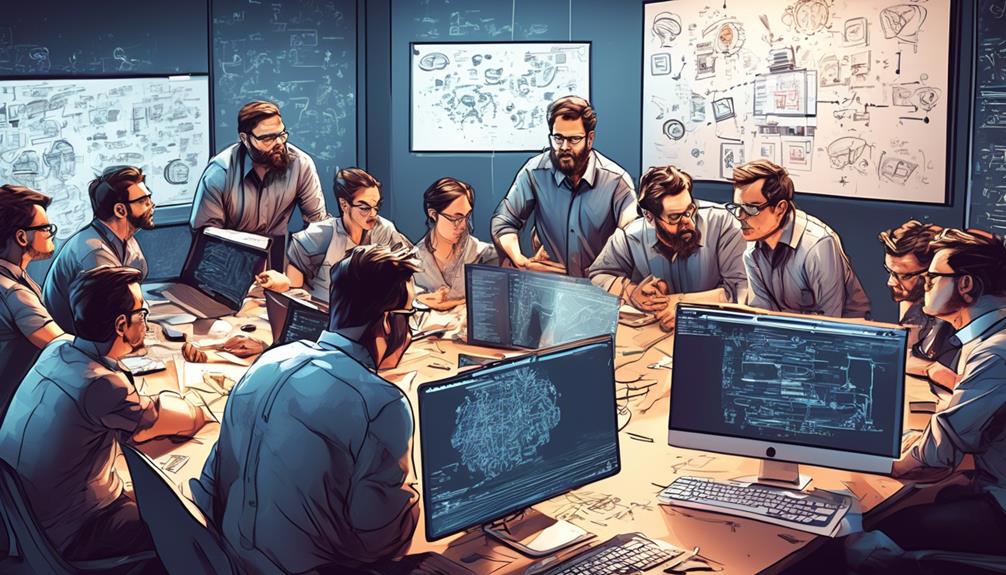Do software quality assurance engineers need a specific educational background to excel in their careers? Although some believe that hands-on experience is more valuable than formal education, it is important to acknowledge the educational routes and training criteria that lay the foundation for success in this industry.
From degree preferences to essential skills and certifications, the world of QA engineering education is multifaceted and ever-evolving. So, what does it take to become a successful software quality assurance engineer, and how do educational choices impact career opportunities in this field?
Key Takeaways
- QA Engineers typically have a Bachelor's degree in computer science, software engineering, or a related technical field.
- They receive specialized training in coding and software development, with proficiency in programming languages like Java, C, or Python.
- QA Engineers can acquire certifications such as ISTQB, CAT, CSQA, CTE, and CPSQ to enhance their knowledge and expertise in software testing and quality management.
- In addition to technical skills, strong communication, research, and time management skills are essential for QA Engineers to succeed in their roles.
Educational Paths for QA Engineers
We frequently obtain a bachelor's degree in computer science, software engineering, or a related technical field as the first step in our educational path towards becoming quality assurance engineers. This foundational education provides us with a strong understanding of software development and information technology.
To specialize in software quality assurance, we pursue additional training in testing and quality assurance methodologies. This can be achieved through coding bootcamps or relevant certification programs, such as the Certified Software Quality (CSQA) certification.
As aspiring quality assurance analysts, we understand the importance of gaining practical experience. Therefore, we actively seek internships or entry-level positions in QA to refine our technical skills and understand industry best practices.
Additionally, continuous enhancement of our skills in programming languages like Java, C#, Python, and knowledge of testing tools and frameworks is crucial for our career development.
We also consider pursuing advanced degrees or certifications to further advance in the field of software quality assurance.
This comprehensive educational path equips us with the necessary technical skills and professional certification to excel as QA engineers.
Degree Requirements for QA Engineers

To meet the degree requirements for software quality assurance engineers, a bachelor's degree in computer science or a related field is typically preferred. However, specialized training in coding and software development can also be gained through coding bootcamps or internships, providing valuable practical experience.
Proficiency in programming languages like Java, C#, or Python is essential for QA engineers, showcasing the need for a strong technical foundation.
Practical experience through internships or entry-level positions is crucial for developing skills in software testing and quality assurance, emphasizing the value of hands-on learning.
Continuous learning and staying updated with industry best practices are important for career advancement as a QA engineer, highlighting the need for ongoing professional development.
Pursuing a degree and gaining practical experience are essential steps towards a successful career in software quality assurance engineering, allowing individuals to build a strong foundation of skills and knowledge in product development and software testing.
Certifications for QA Engineers
Numerous certifications are available for software quality assurance (QA) engineers, providing them with specialized training and expertise in various aspects of software testing and quality management.
The International Software Testing Qualifications Board (ISTQB) certification is widely recognized and covers foundational principles and best practices in software testing.
For QA engineers working in Agile methodologies, the Certified Agile Tester (CAT) certification focuses on testing in Agile environments.
The Certified Software Quality Analyst (CSQA) certification offers comprehensive coverage of software quality management, testing, and process improvement.
Additionally, the Certified Test Engineer (CTE) program focuses on advanced testing techniques, automation, and test management.
Professionals with expertise in software quality processes and methodologies may pursue the Certified Professional in Software Quality (CPSQ) certification.
These certifications not only enhance the skills and knowledge of QA engineers but also demonstrate their commitment to professional development.
QA engineers can obtain these certifications through various professional organizations and career services, such as the Society for Quality (ASQ).
As software quality and testing continue to evolve, obtaining relevant certifications is crucial for QA engineers to stay current and advance their careers.
Skills Needed for QA Engineers

A strong foundation in computer science is essential for QA engineers to excel in their roles. Proficiency in programming languages and debugging tools is crucial for QA engineers to effectively analyze and troubleshoot software issues.
Exceptional communication skills are necessary in different aspects of the role of a QA engineer, including collaborating with developers and conveying complex technical information to non-technical stakeholders.
QA engineers need advanced research skills to gather information and analyze testing results, enabling them to identify and address potential software quality issues.
Moreover, patience, perseverance, and the ability to comply with strict deadlines are necessary traits for a QA engineer to navigate the challenges of software development and testing.
These skills are fundamental for QA engineers to succeed in their roles, ensuring high-quality software is delivered to end-users.
Training for QA Engineers
Training for QA Engineers involves honing the foundational skills in computer science and programming languages, as well as developing advanced communication and research abilities essential for excelling in the role.
A degree in computer science or a related field is typically preferred for QA engineers, providing a solid educational foundation. Specialization in programming languages such as Java, C#, or Python is crucial for understanding the intricacies of software engineering and testing. Additionally, attending coding bootcamps can offer specialized training in software development and testing, enhancing the QA engineer's expertise.
Strong communication skills are imperative, as QA engineers need to collaborate effectively with different groups involved in the development process. Continuous education and staying updated with industry best practices through professional organizations and workshops are vital for keeping pace with evolving quality standards and automated testing technology. This ongoing training ensures that QA engineers are well-equipped to meet the demands of the dynamic software quality assurance landscape.
Frequently Asked Questions
What Education Do You Need to Be a Software Quality Assurance Engineer?
We need a bachelor's degree in computer science or related field, preferably with experience in software development or testing.
Specialized training in programming languages, software testing, and quality assurance methodologies is crucial.
Advanced skills in communication, problem-solving, and attention to detail are essential.
Continuous learning and staying updated with industry best practices is important for career advancement and success as a software quality assurance engineer.
How Do I Become a Quality Assurance Engineer Software?
To become a quality assurance engineer in software, we focus on gaining a relevant educational background, practical experience, and enhancing communication skills.
We seek a degree in computer science or related field, hands-on experience through internships, and collaboration skills for effective communication.
Continuous learning and staying informed about the latest trends and advancements in the field are essential.
Additionally, obtaining relevant certifications enhances our professional credibility and expertise.
What Are the Qualifications for QA Engineer?
We need a bachelor's degree in computer science or a related field.
Specialization in programming languages like Java, C#, or Python is crucial.
Experience in software development or testing, and proficiency in manual and automated software testing is also required.
Strong communication skills and the ability to collaborate with different groups are essential.
Continuous learning and staying up-to-date with industry best practices are important for a successful career as a QA engineer.
Do You Need a College Degree to Be a QA Engineer?
Yes, a college degree is beneficial, but not always necessary to become a QA engineer. Alternative routes like coding bootcamps can provide specialized training.
Specializing in a programming language like Java, C#, or Python can also be advantageous.
Gaining practical experience through internships or contractual positions is crucial.
Continuous development and refinement of technical skills are essential for success in this field.
Conclusion
In conclusion, Software Quality Assurance Engineers typically have a strong educational background in computer science or a related field, with a preference for a bachelor's degree.
They should also possess strong communication skills, be familiar with programming languages and debugging tools, and have the ability to conduct manual and automated software testing.
Continuous learning and staying updated with industry trends are essential for career growth in this field.









